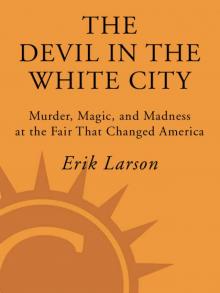- Home
- Erik Larson
In the Garden of Beasts: Love, Terror, and an American Family in Hitler's Berlin
In the Garden of Beasts: Love, Terror, and an American Family in Hitler's Berlin Read online
Also by Erik Larson
Thunderstruck
The Devil in the White City
Isaac’s Storm
Lethal Passage
The Naked Consumer
2011 Crown Publishers International Edition
Copyright © 2011 by Erik Larson
All rights reserved.
Published by Crown Publishers, an imprint of the Crown Publishing Group, a division of Random House, Inc., New York.
www.crownpublishing.com
CROWN and the Crown colophon are registered trademarks of Random House, Inc.
Photo credits appear on this page.
Library of Congress Cataloging-in-Publication Data
Larson, Erik.
In the garden of beasts : love, terror, and an American family in Hitler’s Berlin / by Erik Larson.—1st ed.
p. cm.
1. Dodd, William Edward, 1869–1940. 2. Diplomats—United States—Biography. 3. Historians—United States—Biography. 4. Germany—Social conditions—1933–1945. 5. National socialism—Germany. I. Title.
E748.D6L37 2011
943.086—dc22
2010045402
eISBN: 978-0-307-88795-5
Cover design by Whitney Cookman
Cover photograph © The Art Archive/Marc Charmet
v3.1
To the girls, and the
next twenty-five
(and in memory of Molly, a good dog)
CONTENTS
Cover
Map
Other Books by This Author
Title Page
Copyright
Dedication
Das Vorspiel
The Man Behind the Curtain
PART I Into the Wood
Chapter 1: Means of Escape
Chapter 2: That Vacancy in Berlin
Chapter 3: The Choice
Chapter 4: Dread
Chapter 5: First Night
PART II House Hunting in the Third Reich
Chapter 6: Seduction
Chapter 7: Hidden Conflict
Chapter 8: Meeting Putzi
Chapter 9: Death Is Death
Chapter 10: Tiergartenstrasse 27a
PART III Lucifer in the Garden
Chapter 11: Strange Beings
Chapter 12: Brutus
Chapter 13: My Dark Secret
Chapter 14: The Death of Boris
Chapter 15: The “Jewish Problem”
Chapter 16: A Secret Request
Chapter 17: Lucifer’s Run
Chapter 18: Warning from a Friend
Chapter 19: Matchmaker
PART IV How the Skeleton Aches
Chapter 20: The Führer’s Kiss
Chapter 21: The Trouble with George
Chapter 22: The Witness Wore Jackboots
Chapter 23: Boris Dies Again
Chapter 24: Getting Out the Vote
Chapter 25: The Secret Boris
Chapter 26: The Little Press Ball
Chapter 27: O Tannenbaum
PART V Disquiet
Chapter 28: January 1934
Chapter 29: Sniping
Chapter 30: Premonition
Chapter 31: Night Terrors
Chapter 32: Storm Warning
Chapter 33: “Memorandum of a Conversation with Hitler”
Chapter 34: Diels, Afraid
Chapter 35: Confronting the Club
Chapter 36: Saving Diels
Chapter 37: Watchers
Chapter 38: Humbugged
PART VI Berlin at Dusk
Chapter 39: Dangerous Dining
Chapter 40: A Writer’s Retreat
Chapter 41: Trouble at the Neighbor’s
Chapter 42: Hermann’s Toys
Chapter 43: A Pygmy Speaks
Chapter 44: The Message in the Bathroom
Chapter 45: Mrs. Cerruti’s Distress
Chapter 46: Friday Night
PART VII When Everything Changed
Chapter 47: “Shoot, Shoot!”
Chapter 48: Guns in the Park
Chapter 49: The Dead
Chapter 50: Among the Living
Chapter 51: Sympathy’s End
Chapter 52: Only the Horses
Chapter 53: Juliet #2
Chapter 54: A Dream of Love
Chapter 55: As Darkness Fell
EPILOGUE The Queer Bird in Exile
CODA “Table Talk”
Sources and Acknowledgments
Notes
Bibliography
Photo Credits
About the Author
Endpaper Map
In the middle of the journey of our life I came to myself in a dark wood where the straight way was lost.
—DANTE ALIGHIERI,
The Divine Comedy: Canto I
(Carlyle-Wicksteed Translation, 1932)
Das Vorspiel
prelude; overture; prologue; preliminary match; foreplay; performance; practical (exam); audition; das ist erst das ~ that is just for starters
—Collins German Unabridged Dictionary
(seventh edition, 2007)
Once, at the dawn of a very dark time, an American father and daughter found themselves suddenly transported from their snug home in Chicago to the heart of Hitler’s Berlin. They remained there for four and a half years, but it is their first year that is the subject of the story to follow, for it coincided with Hitler’s ascent from chancellor to absolute tyrant, when everything hung in the balance and nothing was certain. That first year formed a kind of prologue in which all the themes of the greater epic of war and murder soon to come were laid down.
I have always wondered what it would have been like for an outsider to have witnessed firsthand the gathering dark of Hitler’s rule. How did the city look, what did one hear, see, and smell, and how did diplomats and other visitors interpret the events occurring around them? Hindsight tells us that during that fragile time the course of history could so easily have been changed. Why, then, did no one change it? Why did it take so long to recognize the real danger posed by Hitler and his regime?
Like most people, I acquired my initial sense of the era from books and photographs that left me with the impression that the world of then had no color, only gradients of gray and black. My two main protagonists, however, encountered the flesh-and-blood reality, while also managing the routine obligations of daily life. Every morning they moved through a city hung with immense banners of red, white, and black; they sat at the same outdoor cafés as did the lean, black-suited members of Hitler’s SS, and now and then they caught sight of Hitler himself, a smallish man in a large, open Mercedes. But they also walked each day past homes with balconies lush with red geraniums; they shopped in the city’s vast department stores, held tea parties, and breathed deep the spring fragrances of the Tiergarten, Berlin’s main park. They knew Goebbels and Göring as social acquaintances with whom they dined, danced, and joked—until, as their first year reached its end, an event occurred that proved to be one of the most significant in revealing the true character of Hitler and that laid the keystone for the decade to come. For both father and daughter it changed everything.
This is a work of nonfiction. As always, any material between quotation marks comes from a letter, diary, memoir, or other historical document. I made no effort in these pages to write another grand history of the age. My objective was more intimate: to reveal that past world through the experience and perceptions of my two primary subjects, father and daughter, who upon arrival in Berlin embarked on a journey of discovery, transfor
mation, and, ultimately, deepest heartbreak.
There are no heroes here, at least not of the Schindler’s List variety, but there are glimmers of heroism and people who behave with unexpected grace. Always there is nuance, albeit sometimes of a disturbing nature. That’s the trouble with nonfiction. One has to put aside what we all know—now—to be true, and try instead to accompany my two innocents through the world as they experienced it.
These were complicated people moving through a complicated time, before the monsters declared their true nature.
—Erik Larson
Seattle
1933
The Man Behind the Curtain
It was common for American expatriates to visit the U.S. consulate in Berlin, but not in the condition exhibited by the man who arrived there on Thursday, June 29, 1933. He was Joseph Schachno, thirty-one years old, a physician from New York who until recently had been practicing medicine in a suburb of Berlin. Now he stood naked in one of the curtained examination rooms on the first floor of the consulate where on more routine days a public-health surgeon would examine visa applicants seeking to immigrate to the United States. The skin had been flayed from much of his body.
Two consular officials arrived and entered the examination room. One was George S. Messersmith, America’s consul general for Germany since 1930 (no relation to Wilhelm “Willy” Messerschmitt, the German aircraft engineer). As the senior Foreign Service man in Berlin, Messersmith oversaw the ten American consulates located in cities throughout Germany. Beside him stood his vice consul, Raymond Geist. As a rule Geist was cool and unflappable, an ideal subaltern, but Messersmith registered the fact that Geist looked pale and deeply shaken.
Both men were appalled by Schachno’s condition. “From the neck down to his heels he was a mass of raw flesh,” Messersmith saw. “He had been beaten with whips and in every possible way until his flesh was literally raw and bleeding. I took one look and got as quickly as I could to one of the basins where the [public health surgeon] washed his hands.”
The beating, Messersmith learned, had occurred nine days earlier, yet the wounds were still vivid. “From the shoulder blades to his knees, after nine days there were still stripes showing that he had been beaten from both sides. His buttocks were practically raw and large areas thereof still without any skin over them. The flesh had at places been practically reduced to a pulp.”
If this was nine days later, Messersmith wondered, what had the wounds been like immediately after the beating had been delivered?
The story emerged:
On the night of June 21, Schachno had been visited at his home by a squad of uniformed men responding to an anonymous denunciation of him as a potential enemy of the state. The men searched the place, and although they found nothing, they took him to their headquarters. Schachno was ordered to undress and immediately subjected to a severe and prolonged beating by two men with a whip. Afterward, he was released. He somehow made his way to his home, and then he and his wife fled to central Berlin, to the residence of his wife’s mother. He lay in bed for a week. As soon as he felt able, he went to the consulate.
Messersmith ordered him taken to a hospital and that day issued him a new U.S. passport. Soon afterward, Schachno and his wife fled to Sweden and then to America.
There had been beatings and arrests of American citizens ever since Hitler’s appointment as chancellor in January, but nothing as severe as this—though thousands of native Germans had experienced equally severe treatment, and often far worse. For Messersmith it was yet another indicator of the reality of life under Hitler. He understood that all this violence represented more than a passing spasm of atrocity. Something fundamental had changed in Germany.
He understood it, but he was convinced that few others in America did. He was growing increasingly disturbed by the difficulty of persuading the world of the true magnitude of Hitler’s threat. It was utterly clear to him that Hitler was in fact secretly and aggressively girding Germany for a war of conquest. “I wish it were really possible to make our people at home understand,” he wrote in a June 1933 dispatch to the State Department, “for I feel that they should understand it, how definitely this martial spirit is being developed in Germany. If this Government remains in power for another year and carries on in the same measure in this direction, it will go far towards making Germany a danger to world peace for years to come.”
He added: “With few exceptions, the men who are running this Government are of a mentality that you and I cannot understand. Some of them are psychopathic cases and would ordinarily be receiving treatment somewhere.”
But Germany still did not have a U.S. ambassador in residence. The former ambassador, Frederic M. Sackett, had left in March, upon the inauguration of Franklin D. Roosevelt as America’s new president. (Inauguration day in 1933 took place on March 4.) For nearly four months the post had been vacant, and the new appointee was not expected to arrive for another three weeks. Messersmith had no firsthand knowledge of the man, only what he had heard from his many contacts in the State Department. What he did know was that the new ambassador would be entering a cauldron of brutality, corruption, and zealotry and would need to be a man of forceful character capable of projecting American interest and power, for power was all that Hitler and his men understood.
And yet the new man was said to be an unassuming sort who had vowed to lead a modest life in Berlin as a gesture to his fellow Americans left destitute by the Depression. Incredibly, the new ambassador was even shipping his own car to Berlin—a beat-up old Chevrolet—to underscore his frugality. This in a city where Hitler’s men drove about town in giant black touring cars each nearly the size of a city bus.
PART I
Into the Wood
The Dodds arrive in Hamburg. (photo credit p1.1)
CHAPTER 1
Means of Escape
The telephone call that forever changed the lives of the Dodd family of Chicago came at noon on Thursday, June 8, 1933, as William E. Dodd sat at his desk at the University of Chicago.
Now chairman of the history department, Dodd had been a professor at the university since 1909, recognized nationally for his work on the American South and for a biography of Woodrow Wilson. He was sixty-four years old, trim, five feet eight inches tall, with blue-gray eyes and light brown hair. Though his face at rest tended to impart severity, he in fact had a sense of humor that was lively, dry, and easily ignited. He had a wife, Martha, known universally as Mattie, and two children, both in their twenties. His daughter, also named Martha, was twenty-four years old; his son, William Jr.—Bill—was twenty-eight.
By all counts they were a happy family and a close one. Not rich by any means, but well off, despite the economic depression then gripping the nation. They lived in a large house at 5757 Blackstone Avenue in Chicago’s Hyde Park neighborhood, a few blocks from the university. Dodd also owned—and every summer tended—a small farm in Round Hill, Virginia, which, according to a county survey, had 386.6 acres, “more or less,” and was where Dodd, a Jeffersonian democrat of the first stripe, felt most at home, moving among his twenty-one Guernsey heifers; his four geldings, Bill, Coley, Mandy, and Prince; his Farmall tractor; and his horse-drawn Syracuse plows. He made coffee in a Maxwell House can atop his old wood-burning stove. His wife was not as fond of the place and was more than happy to let him spend time there by himself while the rest of the family remained behind in Chicago. Dodd named the farm Stoneleigh, because of all the rocks strewn across its expanse, and spoke of it the way other men spoke of first loves. “The fruit is so beautiful, almost flawless, red and luscious, as we look at it, the trees still bending under the weight of their burden,” he wrote one fine night during the apple harvest. “It all appeals to me.”
Though generally not given to cliché, Dodd described the telephone call as a “sudden surprise out of a clear sky.” This was, however, something of an exaggeration. Over the preceding several months there had been talk among his friends that one day a call
like this might come. It was the precise nature of the call that startled Dodd, and troubled him.
FOR SOME TIME NOW, Dodd had been unhappy in his position at the university. Though he loved teaching history, he loved writing it more, and for years he had been working on what he expected would be the definitive recounting of early southern history, a four-volume series that he called The Rise and Fall of the Old South, but time and again he had found his progress stymied by the routine demands of his job. Only the first volume was near completion, and he was of an age when he feared he would be buried alongside the unfinished remainder. He had negotiated a reduced schedule with his department, but as is so often the case with such artificial ententes, it did not work in the manner he had hoped. Staff departures and financial pressures within the university associated with the Depression had left him working just as hard as ever, dealing with university officials, preparing lectures, and confronting the engulfing needs of graduate students. In a letter to the university’s Department of Buildings and Grounds dated October 31, 1932, he pleaded for heat in his office on Sundays so he could have at least one day to devote to uninterrupted writing. To a friend he described his position as “embarrassing.”
Adding to his dissatisfaction was his belief that he should have been further along in his career than he was. What had kept him from advancing at a faster clip, he complained to his wife, was the fact that he had not grown up in a life of privilege and instead had been compelled to work hard for all that he achieved, unlike others in his field who had advanced more quickly. And indeed, he had reached his position in life the hard way. Born on October 21, 1869, at his parents’ home in the tiny hamlet of Clayton, North Carolina, Dodd entered the bottom stratum of white southern society, which still adhered to the class conventions of the antebellum era. His father, John D. Dodd, was a barely literate subsistence farmer; his mother, Evelyn Creech, was descended from a more exalted strain of North Carolina stock and deemed to have married down. The couple raised cotton on land given to them by Evelyn’s father and barely made a living. In the years after the Civil War, as cotton production soared and prices sank, the family fell steadily into debt to the town’s general store, owned by a relative of Evelyn’s who was one of Clayton’s three men of privilege—“hard men,” Dodd called them: “… traders and aristocratic masters of their dependents!”

 Lethal Passage: The Story of a Gun
Lethal Passage: The Story of a Gun In the Garden of Beasts: Love, Terror, and an American Family in Hitler's Berlin
In the Garden of Beasts: Love, Terror, and an American Family in Hitler's Berlin Dead Wake: The Last Crossing of the Lusitania
Dead Wake: The Last Crossing of the Lusitania The Splendid and the Vile
The Splendid and the Vile Thunderstruck
Thunderstruck Isaac's Storm: A Man, a Time, and the Deadliest Hurricane in History
Isaac's Storm: A Man, a Time, and the Deadliest Hurricane in History In the Garden of Beasts
In the Garden of Beasts The Devil in the White City
The Devil in the White City